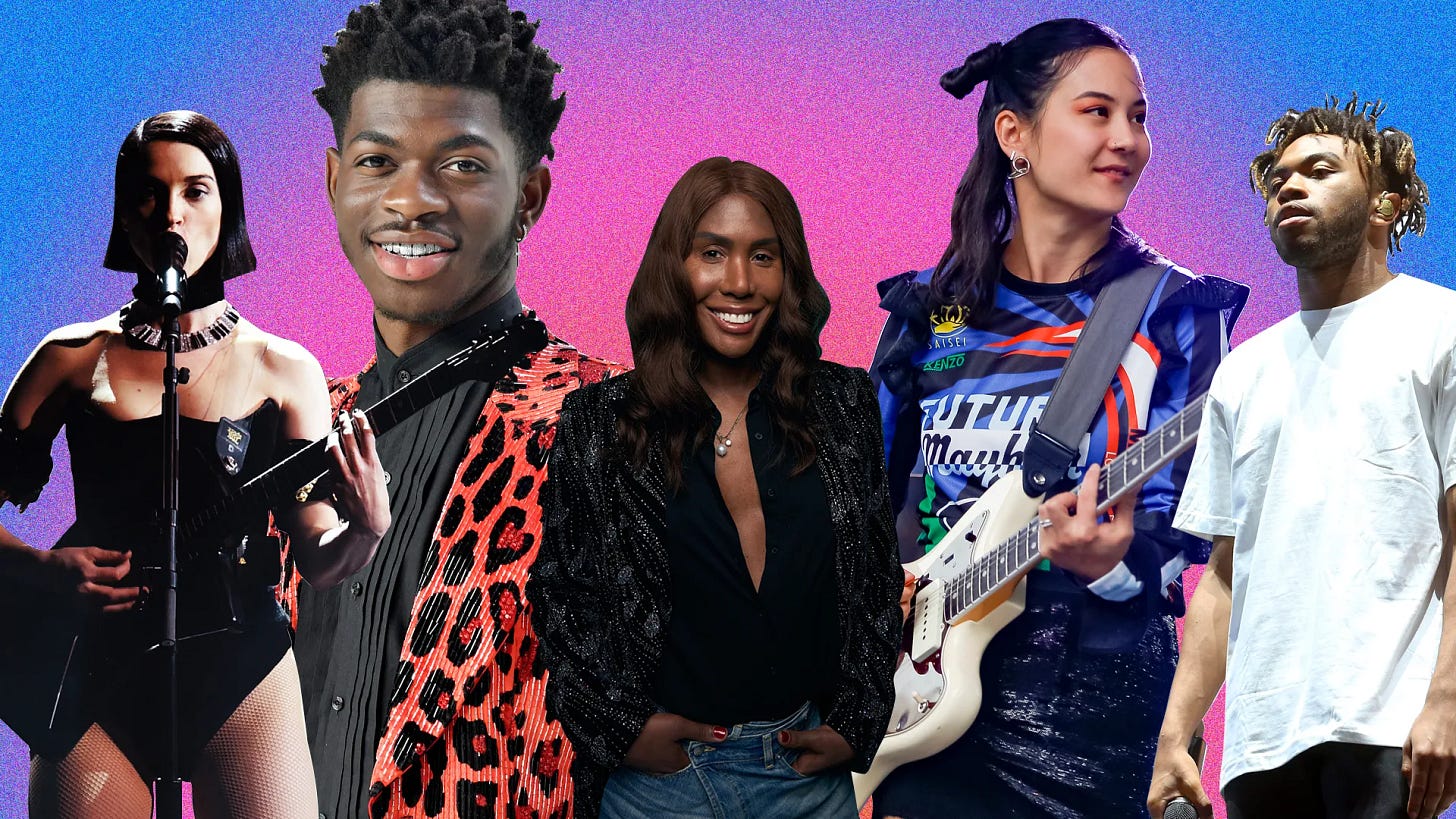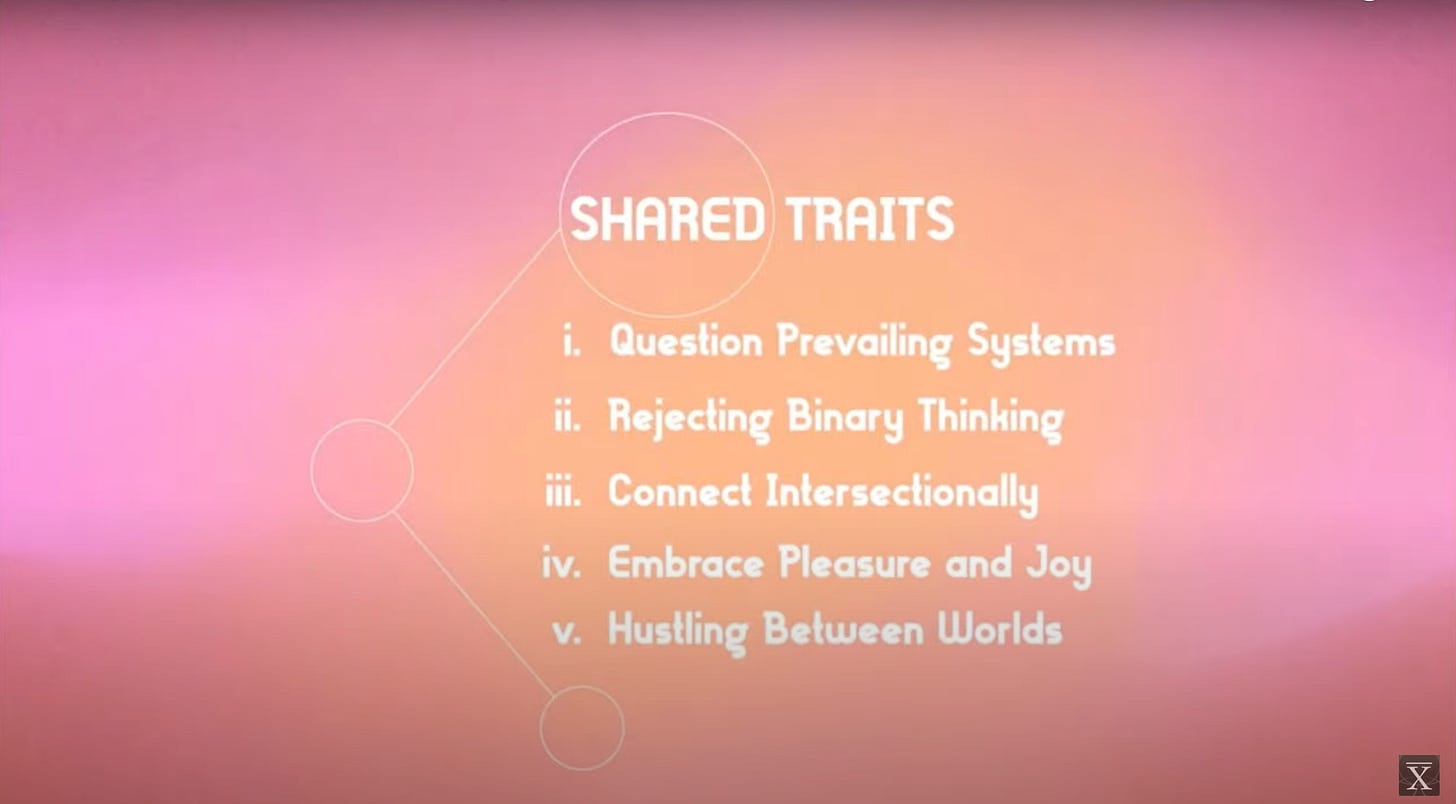🏳️🌈✨The Nexialist #0024
"The Gay Number" | Nexialist LGBTQ+ in Retrospective | Polygendered Brazilian Music | Lesbian Gaze | Dyke Camp | BDSM Test | Who Loves Fruit? | La Veneno | Queering the Future | Decolonizing Foresight
Welcome to my weekly (nexia)list of my (non)sense-making of my internet finds!
With this memorable birthday (probably one of the happiest days of my life, I would say, thank you for all the lovely messages), lots of work and my upcoming 5-day vacation (starting today), the moment I was fearing has arrived, my dear Nexialist reader: this 32-year old man who writes you, did not have enough time/energy to write this week’s Nexialist (or at least the way he usually does). Here’s what will happen: I had written a few things before, which I’ll share below with you PLUS some LGBTQ+ Highlights (copy/paste) that I have shared in past editions of the Nexialist, for those of you who arrived a bit later or just might once to revisit and reactivate it in your brain. I hope you enjoy this format, it’s quick but still made with love (and glitter).
🦌The Gay Number
In Brazil, 24 is popularly known as the gay/queer number, so I could not let Nexialist#24 not introduce you to this piece of Brazilian Culture. In school, I was often #24 on the name list and of course, jokes were made about it. “Jogo do bicho (Animal Game), an illegal gambling game in Brazil, is responsible for the strong association of the number 24 with homosexuality in Brazil. In the game, 24 is the number given to the deer (veado in Portuguese), an animal that has long been pejoratively associated with gay men.” Believe it or not, still today, the “jersey number 24 is heavily avoided by male Brazilian athletes, with rare exceptions. Football players, for example, usually reject this number for their jerseys and may express dissatisfaction when obligated to wear a 24 jersey due to fixed number rules in international competitions.” Just a glimpse at the toxic masculinity still prevalent in sports…
Read: How a football shirt number is being used to oppose homophobia in Brazil.
🇧🇷Polygendered Brazilian Music (#0008)
Ponto Eletronico released this piece in 2016 called Polygendered Brazilian Music: The Tombamento Generation, written by Filipe Techera.
When analyzing contemporary artistic expression, especially Brazilian music, it is undeniable that there is a link between the artists. The Tombamento Generation, is taking the spotlight; a new wave of singers whose work is united by the representative force of society’s key issues – race, gender, and sexuality. The concept arose from the Black Movement and describes new artistic expressions that operate as a way of fighting and protesting.
Although there is debate as to whether their position is political or aesthetic - or both - this group of artists and their audience together strive to break down the standards of common sense.
Looking back now, I see how much the movement has influenced and grown into the mainstream. I also have been realizing it is a global movement, with its different local twists, and that makes me so proud. In the post, you’ll get to know some artists from that period, so I introduced you to Urias above, to update the list a bit. I love her fierce attitude, the lyrics, the video and is it only me who’s hypnotized?
👩❤️👩Lesbian Gaze (#0012)
Since I learned the term Female Gaze, my brain has not been the same. It’s like I can tell when something was not made/directed/whatever by a white cis straight man, like it usually is. A couple of weeks ago my sister recommended me Anne+ (Now on Netflix), and I’m enamored. It’s so refreshing to watch content made by queer people:
ANNE+ is a drama series about the (love)life of Anne, a twenty-something lesbian living in Amsterdam. In each episode we learn more about Anne and her past and present love interests as well as her friends, family and colleagues. The focus is always on Anne “plus” someone in her life. ANNE+ is a light series about identity, relationships and finding your place in the world. It was initiated because of the lack of positive queer representation in film and television. The ANNE+ team is composed of mostly female, queer filmmakers who feel personally connected to the series and want to make a difference.
Just for the reasons above you should watch it. But I’ll tell you what I experienced when watching the first season (6 episodes, 10 minutes each, you won’t regret trying it). It feels so intimate to watch her stories. So familiar. I fell in love so many times while watching it, with Anne and with her lovers. It seems like the characters are real people. Also, it feels so nice to see the streets of Amsterdam on screen and watch a non-cliche tragic lesbian story. I want more entertainment like this! (Subtitles in English are available).
🏳️🌈Dyke Camp (#0012)
This reminded me of another term I recently learned: Dyke Camp. In this 2018 article from The Outline, Mikaella Clements introduces us to this cultural movement that is only growing since then. First, I need to fill you in a bit about Camp, in case you’re not familiar. It was a pretty big word in 2019 due to its fashion invocation at the 2019 MET Gala:
Susan Sontag was the first person to attempt to properly define camp, in her seminal 1964 essay “Notes on Camp.” Her approach has been debated in the 50 years that have followed, particularly in her emphasis on camp as something that is all style over content. But her initial definition of camp as a sensibility marked by artifice, stylization, exaggeration, theatricality, playfulness and irony still holds up fairly well, particularly in her announcement that the “essence of Camp is its love of the unnatural.”
For many people, it’s a synonym of gay. It is indeed quite connected in the collective imaginary to the stereotyped gay man, but in its essence, it’s beyond that. It’s about artifice and exaggeration. Flamboyance. Baroque is camp. Fashion is camp. Lady Gaga is camp. In this article, even Donald Trump is said to be camp and I cannot stop thinking about it because it makes sense. Now back to Dyke Camp:
Dyke camp overlaps with camp in some areas, certainly. But in others it is completely different; it has its own electric vision. If camp is the love of the unnatural, dyke camp is the love of the ultra-natural, of nature built up and reclaimed, of clothes that could be extensions of the body, of desire made obsessive, of lesbian gestures or mannerisms maximized by a thousand.
And here’s the catch for me. If the Future is Female, of course, this movement is around us. And I’m here for it. I want more!
Read: Susan Sontag’s 54-year-old essay on “camp” is essential reading - Quartz
🏳️🌈LGBTQ+ Albums in 2021 (#0008)
Going on the road, this week I came across this post with 16 Albums LGBTQ+ Artists Are Teasing in 2021. It’s great to see artists that I love there (Romy from The xx, Octo Octa, and Honey Dijon) along with some new faces. Gimme more of that!
📝By the way, Them is a great resource for LGBTQ+ culture.
😈BDSM Test: What kind of sexual deviant are you? (#006)
How kinky are you? I took this BDSM test some time ago, and it's actually a great tool to self-assess your kinks/preferences. It's a great exercise to do with your partner, show each other's results and talk about it. Or to send to your crush.
🍌Who Loves Fruit? (#006)
"Banana and Papaya are the same; they're fruit." Kany García and Residente are Puerto Rican artists that Juan showed to me. The song is full of innuendos in the lyrics and video, with clear bisexual preferences, which is beautiful to see. The music's wordplay is fun, inviting us to question gender roles in and out of bed.
💋Inspired by the kissing scene, I made a video playlist of kissing videos. Enjoy!
💃🏽La Veneno (#004)
This HBO Max series has been giving me so much life. In Spain, La Veneno was famous in the 90s for being an outspoken and unapologetic media personality and sex worker. In the series, Valeria is a university student who wants to write a paper about Veneno, analyzing the media's responsibility on trans visibility. The way the story is told, comparing both of these characters' trajectories and bringing other trans characters (and actresses), makes it unique and engaging. It's based on real events and people, and even some of these people play parts in the series or do cameo appearances. It gave me chills and made me cry a few times. Great to practice your queer Spanish.
🏳️🌈Queering the Future (#005)
I recently watched this presentation that Jason Tester gave about his project, Queer the Future: How LGBTQ Foresight Can Benefit All. I brought a “summary” of the video with some quotes and highlights of things that got my attention (still working on my synthesizing skills😬)
Jason begins by suggesting the transformation of the adjective queer into a verb, which I found to be a very powerful provocation:
He also puts in perspective how statistically our community is more vulnerable: from the lack of support from some families and communities, to the greater chances of us being feeling loneliness in old age.
In his exercise of imagining possible, probable and preferred futures, he asks a valid question:
What if queer culture … is itself a cultural evolutionary mutation ready to confer advantages of survival and resilience of humanity?
Then, Jason shares his study: five traits/skills that overlap between Queer Cultures and the mindsets and practices which will confer success in the future we’re likely headed towards.
(There are mode details to this one in the original post. Check here)
🛰Decolonizing Foresight (#0021)
Lydia Caldana created an open-source platform that we all wanted. It’s worth exploring and (collaborating).
Future Resources is a platform that decolonizes foresight / strategy / innovation by radically democratizing access to sources of information, events and networking. It is built on the premise that these industries need more representation of ethnically, geographically, bodily, economically, etc, diverse people in leadership positions.
Through the curation of events, websites, books, podcasts, newsletters, communities, databases, among others, and by spotlighting pioneering womxn and non-binary folks in the field, Future Resources works as a horizontal tool for knowledge sharing, community building and networking.
Womxn and non-binary people of all colors, sizes, places of origin, sexual orientations, gender identities and backgrounds are invited to contribute to the tool. There is no 'right' or 'wrong' and we always welcome feedback.
🤏Xuxa Hits
I’ll just add this here as a random surprise because I can… Just one of these priceless pieces of documentation of when Brazilian TV was no-man’s land. Xuxa is Brazil’s “Queen of the Children” recognized all over Latin-America for being a tv host, singer, actress, and model in the 80s and 90s. Growing up I remember her show being on TV every weekend and now I see that everything about it is Camp.
❤️If anything made your brain tingle, click like and don't hesitate to share it with the world. It helps The Nexialist to reach more curious minds. See you next week!🦦
🫀If you enjoyed this newsletter, please share it with your friends. If someone amazing sent it to you, tell them you love them, and you can subscribe at thenexialist.substack.com. If you want to know what a Nexialist is, click here. If you want to introduce yourself or give me any feedback, I would love to hear from you. Drop me an e-mail or say hi on LinkedIn or Instagram.











Thanks for yet another super-inspiring edit and congratulations on your birthday! So great you managed to align both Veneno and Xuxa in the same thread.X.